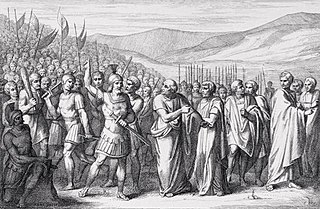Related Research Articles
Gnaeus Calpurnius Piso, was a Roman statesman during the reigns of Augustus and Tiberius. He served as consul in 7 BC, after which he was appointed governor of Hispania and consul of Africa. Piso is best known for being accused of poisoning and killing Germanicus, the heir of emperor Tiberius.

The decemviri or decemvirs refer to official 10-man commissions established by the Roman Republic.
The gens Acilia was a plebeian family at ancient Rome, that flourished from the middle of the third century BC until at least the fifth century AD, a period of seven hundred years. The first of the gens to achieve prominence was Gaius Acilius, who was quaestor in 203 and tribune of the plebs in 197 BC.
Manius Acilius Glabrio was a Roman statesman and general, grandson of the jurist Publius Mucius Scaevola.

Lucius Calpurnius Piso Caesoninus was a prominent Roman senator of the early Empire. His tenure as pontifex led him sometimes to be called Lucius Calpurnius Piso Pontifex, to differentiate him from his contemporary, Lucius Calpurnius Piso the Augur, consul in 1 BC. He was a confidant of the emperors Augustus and Tiberius.
Publius Cornelius Sulla was a politician of the late Roman Republic and the nephew of Lucius Cornelius Sulla. He was also a brother-in-law of Pompey, having married his sister Pompeia.
Appius Claudius Crassus InregillensisSabinus was a Roman senator during the early Republic, most notable as the leading member of the ten-man board which drew up the Twelve Tables of Roman law around 451 BC. He is also probably identical with the Appius Claudius who was consul in 471 BC.

The gens Calpurnia was a plebeian family at ancient Rome, which first appears in history during the third century BC. The first of the gens to obtain the consulship was Gaius Calpurnius Piso in 180 BC, but from this time their consulships were very frequent, and the family of the Pisones became one of the most illustrious in the Roman state. Two important pieces of Republican legislation, the lex Calpurnia of 149 BC and lex Acilia Calpurnia of 67 BC were passed by members of the gens.
Gaius Calpurnius Piso was a politician and general from the Roman Republic. He became praetor urbanus in 72/71 BC. After being elected consul in 67 BC, Piso opposed Pompeius' friends, the tribunes Gaius Cornelius and Aulus Gabinius. Assigned both Gallia Narbonensis and Gallia Cisalpina, he remained as proconsul until 65, or perhaps later in Cisalpina. Piso defeated an Allobrogian rebellion and repressed troubles in Transpadana, for which he was unsuccessfully prosecuted by Caesar. He supported Cicero during the Catiline conspiracy.
Licinia is the name used by ancient Roman women of the gens Licinia.
The lex Calpurnia de repetundis was a Roman law sponsored in 149 BC by the tribune of the plebs Lucius Calpurnius Piso. It established the first permanent criminal court in Roman history, in order to deal with the growing number of crimes committed by Roman governors in the provinces. The lex Calpurnia was a milestone in both Roman law and politics.
Lucius Calpurnius Piso Frugi was a Roman politician and historian. He created the first permanent jury court in Rome to try cases related to provincial corruption during his plebeian tribunate in 146 BC. He also fought, not entirely successfully, in the First Servile War. He was consul in 133 BC and censor in 120 BC.
Lucius Manlius Torquatus was a consul of the Roman Republic in 65 BC, elected after the condemnation of Publius Cornelius Sulla and Publius Autronius Paetus.
The gens Sextia was a plebeian family at ancient Rome, from the time of the early Republic and continuing into imperial times. The most famous member of the gens was Lucius Sextius Lateranus, who as tribune of the plebs from 376 to 367 BC, prevented the election of the annual magistrates, until the passage of the lex Licinia Sextia, otherwise known as the "Licinian Rogations," in the latter year. This law, brought forward by Sextius and his colleague, Gaius Licinius Calvus, opened the consulship to the plebeians, and in the following year Sextius was elected the first plebeian consul. Despite the antiquity of the family, only one other member obtained the consulship during the time of the Republic. Their name occurs more often in the consular fasti under the Empire.

The first secessio plebis was a significant event in ancient Roman political and social history that occurred between 495 and 493 BC. It involved a dispute between the patrician ruling class and the plebeian underclass, and was one of a number of secessions by the plebs and part of a broader political conflict known as the conflict of the orders.
LuciusFulcinius Trio was a Roman senator who came from a plebeian family. Trio was an active prosecutor (delator) during the reign of Tiberius who developed a reputation for making accusations. He was governor of Lusitania from about 21 to 31, before returning to Rome to hold the office of consul suffect with Publius Memmius Regulus in 31. His friendship with Sejanus would lead to allegations that ended with his suicide in early 35.

Lucius Calpurnius Piso was a Roman senator active in the first century AD. During the Year of Four Emperors he was governor of Africa and supported Vitellius. After the death of Vitellius he was killed by supporters of Vespasian.
Gaius Cornelius was a politician during the late Roman Republic. He is most famous for serving as tribune of the plebs in 67 BC.

The lex Pompeia de ambitu was a law of the Roman Republic, passed in 52 BCE, aimed at prosecuting bribery and corruption in elections. It was proposed and enacted by Pompey the Great, who used it to prosecute and exile his political enemies.
References
- ↑ William Wardlaw Ramsay (1863). A manual of Roman antiquities. pp. 308–.
- ↑ Cassius Dio, Roman History, 36.38-40.1